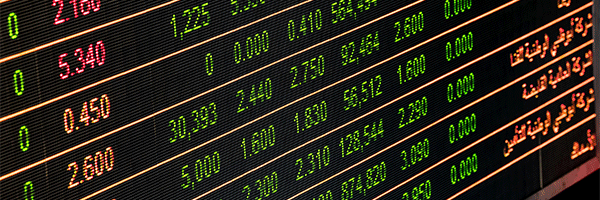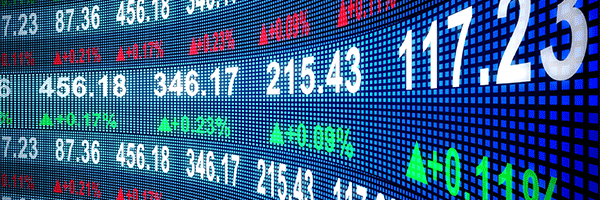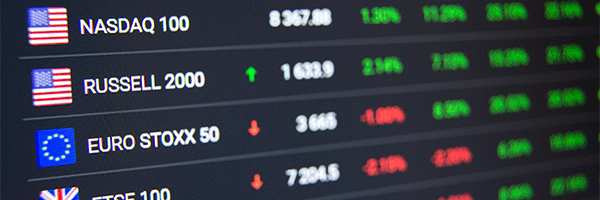
November 10, 2023 | Daily JAM, Mid Term, Morning Briefing |
My bets on rising volatility have been hammered in the last few days. The December 20 Call Options on the CBOE S&P 500 Volatility Index (VIX) at $280 a contact dropped another 21% today to $121 a contract. The January 17 Call Options at 17 that I bought for $268 closed at $211, down another 16%.The VIX itself ended the day at 14.23, down 7% for the session. It’s sure hard looking at losses like this. But I would remind you that the VIX is very volatile. The volatility index was at 21.71 on October 20. And that the calendar is marked with two big events that could reunite financial market volatility, one courtesy of the House of Representatives and the other courtesy of the Federal Reserve.

October 27, 2023 | AMZN, Daily JAM, INTC, Short Term, Top 50 Stocks, VIX, Volatility |
To subscribe to JAM you need to fill in some details below including, ahem, some info on how you'll pay us. A subscription is $199 (although if you're subscribing with one of our special offers it will be lower) for a year for ongoing and continuing access to the...

October 24, 2023 | AAPL, ALB, CAT, Daily JAM, DE, Dividend Income, DUK, F, GM, Jubak Picks, Mid Term, NI, SCCO, Short Term, Special Reports, Top 50 Stocks |
I’ve hi-lighted the key characteristics of the coming global debt bomb explosion that investors MUST include in any plan to protect a portfolio from the explosion of this bomb.

October 3, 2023 | Daily JAM, Short Term, Volatility |
The VIX, the CBOE S&P 500 Volatility Index, climbed another 12.32% today, October 2, to 19.78. The Call Options–with a strike at 17 and an expiration on December 20–I bought on the VIX on September 25 are up 38% as of the close on October 2. (I hold them in my Volatility Portfolio.) I’m inclined to hold them a bit longer because:

October 1, 2023 | Daily JAM, Short Term |
Kicking the shutdown 45 days down the road doesn’t change a single vote in Congress. The question remains exactly what it was before Saturday’s vote–Will McCarthy–or whoever is Speaker–use Democratic votes to pass legislation to fund the operations of the Federal government? Anything that increases the chances the Congress will return to its pre-vote chaos–or worse–will be a negative for financial markets. Anything that points to a full fiscal year budget based on a willingness to use Democratic votes in the House to pass a full fiscal year budget will be a positive for financial markets.

September 24, 2023 | Daily JAM, Morning Briefing, Short Term, Volatility |
Tomorrow, Monday, morning I’ll buy CBOE S&P Volatility Index (VIX) Call Options (so the options will go up in price if volatility does) for my Volatility Portfolio. I’m buying the December 20 Call Options with a strike price of 17 (VIX231220C00017000.)

September 20, 2023 | Daily JAM, Volatility |
The CBOE Volatility Index, which measures short-term volatility in the Standard & Poor’s 500 stocks, has been stuck below its long-term average of near 17 since the regional bank crisis of March 2023. In recent months, the VIX has had a hard time breaking above 17 with the index spending most of its time down about 15. Today, at 1 p.m. New York time, the VIX was at just 14.01, down 0.71% ahead of the Federal Reserve’s interest rate decision. There’s just no fear in this market. So it will extremely interesting to see if today’s interest rate decision and the release of new Dot Plot forecasts for interest rates, inflation, economic growth, and unemployment today from the Fed has any effect of market complacency.

June 29, 2023 | Daily JAM, Morning Briefing, Short Term |
This morning all the way in New York I could hear the gnashing of teeth from Jerome Powell’s office at the Federal Reserve. “What do we have to do to slow consumer spending in the Untied States?” he cried after this morning’s economic data. Today the Commerce Department sharply raised its judgement on first quarter GDP growth. The last revision to the data showed the U.S. economy growing at a 2% annual rate from January through March. That was a huge step up from the 1.3% growth repoRrted in the previous GDP estimate.

May 24, 2023 | Daily JAM, Short Term |
Three numbers caught my eye today as indications of where the financial markets are headed in the short term. I’m looking at the moves in the Russell 2000 small-cap index. In the CBOE S&P 500 Volatility Index ( VIX). And in the odds on interest rate increases from the Federal Reserve on the CME FedWatch tool.

May 20, 2023 | Daily JAM, Short Term |
I expect more posturing, more attempts to extract leverage, and more blaming–but, in my opinion, no debt ceiling deal this week. The big question: “When does the stock market start to take the possibility seriously–unthinkable as it might be–that the United States could default on its debt.
May 10, 2023 | Daily JAM, Videos |
Today’s topic is Lots of Volatility – But It’s Not Tradeable. The market has not been responding as expected to recent events. On Friday, May 5, a combination of a chaotic market, a banking crisis, and job numbers that were much higher than expected, resulted in a completely unexpected market reaction. On previous behavior, these higher job numbers would have led to a conclusion that the Fed would continue to raise rates. Stocks would have tumbled. But Friday this time, we got a big rally in the news in the report. The market is vacillating between belief in a recession with banks failing, and belief in a strong job market where the Fed continues to raise rates. That’s created a scenario of wild swings, driven more, I’d argue, by where prices have been recently than by any trend in the news. You can see this in the VIX. The “fear index” rise as banks struggled but the jobs report said that it was alright to bid bank stocks (and the market in general) higher on the day even if the regional banking crisis is a long way from over. I’d prefer to trade volatility when “all” it requires is getting the direction of the news correct. Bu,t the current market requires getting both the trend in th news and the markrt’s reaction to that trend right in order to make a profit. That’s harder than I’d like and it seems prudent to wait for more predictable (and tradeable) volatility.
May 8, 2023 | Daily JAM, Morning Briefing |
The next potential BIG volatility day comes on Tuesday, May 9, when President Joe Biden is scheduled to meet with Speaker of the House Kevin McCarthy will hold talks on raising the debt ceiling to avert a U.S. default. I don’t expect a breakthrough of any dimension. The politics say to me that both sides are dug in and that we’re still too far away–weeks perhaps–from the excrement hitting the propellers. The question for investors and traders is when the financial markets might start taking the prospects of a U.S. default seriously.












